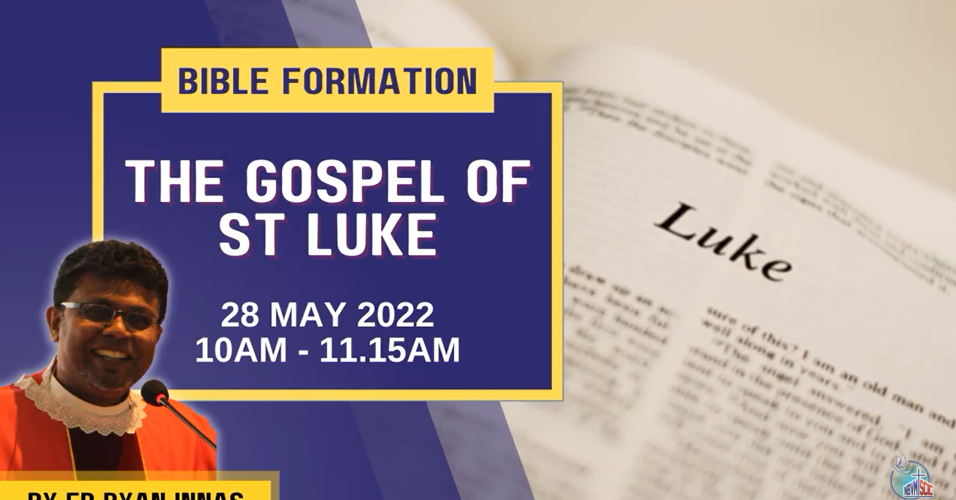Bible Formation: Holy Spirit in the Life of the Church
Recap: 26 February 2022 Discipleship is a Journey in Imitating Christ
To be his disciples, we must understand the role of Christ; come closer to Christ so that we are moulded to be Christ-like. There are many models in the world but the disciple of Christ has only Jesus as a model to imitate.
Discipleship is a personal call to follow Christ – to align our mission with His mission. The call of Levi (Lk5:27) ‘follow me” in the Greek language “ akoloutheō” means giving up and sacrificing yourself for Christ.
Discipleship is a journey-therefore sometimes we may drift away and may misunderstand. Thus we need to turn back and imitate by hearing and acting on the word- listen and then act.
Recap: 26 March, Universal Salvation through the Presence of Christ
Universal salvation means Salvation for all, not just the Jews but also the Gentiles. Salvation became available to all through the presence of Jesus.
Salvation in Greek is soterion, which means delivering from darkness to new life; slavery of sin to freedom. Soter means an agent of salvation –God used Jesus as an agent to bring deliverance to mankind. Thus, Christ delivers all those who cry out to him and put confidence in him.
Salvation comes from repentance and encountering Christ. Salvation is also listening to the voice of God- the word of God. The plan of God for salvation continues in us and we need to reach out the ‘annawim’ as Jesus did.
28 May: Holy Spirit in the Life of the Church
This time the session focused on the Holy Spirit. The book of Luke focuses on the life of Jesus whereas the Acts of Apostles focuses on the life of the church. There are about 75 references to the Holy Spirit in both Luke and Acts.
In the book of Luke, the 17 references to the Holy Spirit begins in chapter1 of Luke with John the Baptist being filled with the Holy Spirit, next Mary, Elizabeth, Zechariah, Simeon ( chapter 20) and the baptism of the Holy Spirit in Chapter 3.
The Holy Spirit is known as ‘ruach ha kodesh’ in Hebrew which means breath and in Greek ‘pneuma hagion’ which means breath or wind, while in Latin ‘spiritus sanctus’. In Hebrew the word ‘ruach’ has a feminie attachment while in Greek it is neuter and in Latin a masculine attachment. As such, God has no gender. God is all.
Luke portrays the spirit as the activity and the presence of God(Lk 4: 18). The idea of the spirit is seen from the perspective of universal salvation. The Spirit empowered Jesus to do the work and the same spirit empowers Christians to carry out their mission. Jesus will continue to save thru apostles with the help of the Holy Spirit that equips the apostles and disciples.

Acts is also known as the Book of the Holy Spirit. It gives 5 vivid accounts of the dramatic outpouring of the Holy Spirit- Pentecost (Acts 2:14); Prayer of the community (4: 28-31) where the spirit gives the courage to speak the word of God; with the Samaritans ( 8:14); Paul in Ephesus ( 19:6) and the Baptism of Gentiles (10: 44-45).
The spirit is in the life of the church( Acts 2: 42-47; 4: 32-37)- God wants to form a messianic people in idealistic terms –listen to the teaching of the apostles, being one mind and heart, sharing possessions, breaking bread and praying.
The question is do we have these idealistic terms?
IF we do not have this – we are not allowing Holy Spirit to guide us- the spirit is there when we imitate the suffering of Christ. If you do not bring unity to the community – there is no spirit in the church. The spirit works thru us like Jesus – reaching out to sinners and outcasts
The book of Acts lists the many roles of the spirit- inspires, guides and instructs us. One receives the HS when one repents and is baptised; Holy Spirit sometimes precedes baptism; when you test or oppose the Holy Spirit – there are dire consequences; Holy Spirit helps the prophesy; the spirit is conferred thru laying of hands; speaks to apostles and prophets; leads and guides the decisions and actions of Christian leaders. Hence, we can ask the Holy Spirit to work in us because we are instruments of God.
How do you know that a decision is from God? The spiritual exercise on consolation and desolation by St. Ignatius of Loyola explains that when a decision is from God, we receive great consolation.
The Holy Spirit empowers us to do the same miracles as Jesus did, to be a witness of Jesus, to glorify God and expand the church. Some of us have gifts for miracles- we are to use our gifts to bring salvation to the world.
Reflection: What kinds of power did the Holy Spirit make available to Christians in Acts? How?

